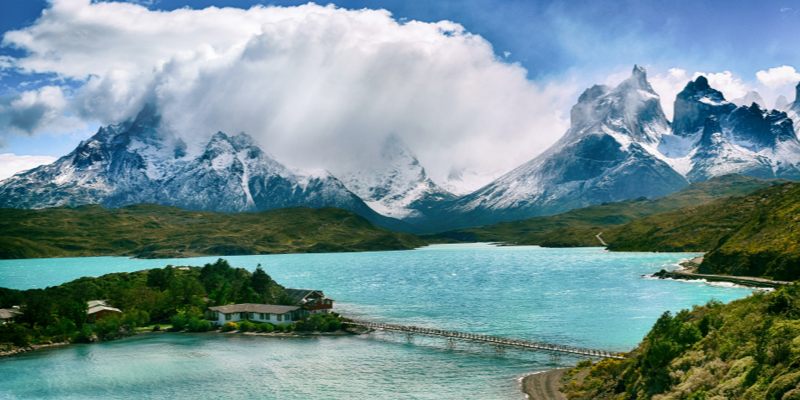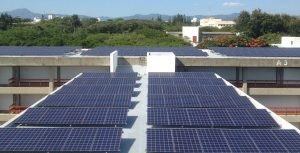Chile
Country related projects
Chile is considered a highly vulnerable country because it presents 7 out of 9 characteristics that the UNFCCC has defined in that regard. The impacts of climate change affect society and natural habitats throughout the whole territory and transversally to several economic sectors. The “Atlas de Riesgos Climáticos” (ARClim) project, foresees that temperature will increase in average 1,15°C to 2°C by the period 2035-2065 in relation to the baseline scenario. Regarding precipitations, Chile has been experiencing 14 dry years in a row, and is expected a reduction of 15% in accumulated precipitation in the Chilean central zone, which would be the most affected.
In April 2020 Chile presented its updated NDC which was elaborated through a broad participatory process, and it incorporates several goals regarding GHG, short-lived air pollutants, adaptation and resilience, oceans, circular economy, forests, peatlands, ecosystems and a social component.
In terms of mitigation, the updated Chilean NDC commits the following fundamental elements:
- A GHG emissions budget that will not exceed 1,100 MtCO2eq, between 2020 and 2030, with a maximum (peak) GHG emissions by 2025, and to reach a GHG emission level of 95 MtCO2eq by 2030.
- A reduction of at least 25% in total black carbon emissions by 2030, compared to 2016.
In terms of adaptation to climate change, the Chilean updated NDC defines that the planning and implementation of actions will have a special emphasis on water and sanitation management, and disaster risk management. In addition, sectors must work on their adaptation plans – by either updating or elaborating them.
Other important priority area is Integration. It considers topics intersecting mitigation and adaptation, and is comprised by Circular Economy; Land Use and Land Use Change and Forestry (LULUCF); Transversal to Ecosystems and Oceans. The fundamental elements of the commitments for those sub-areas for the following years are presented hereunder:
- In terms of Circular Economy, Chile is committed to develop circularity metrics and indicators by 2022.
- Regarding LULUCF, our country is committed to: (i)the sustainable management and recovery of 200,000 hectares of native forests; afforesting 200,000 hectares, of which at least 100,000 hectares correspond to permanent forest cover (with at least 70,000 hectares with native species). (ii) Reducing emissions from the forest sector due to degradation and deforestation of native forests by 25% by 2030. (iii) Elaborating a national inventory of peatlands areas as well as other types of wetlands by 2025. (iv) Developing standardized metrics to assess the capacity for adaptation or mitigation to climate change of wetlands, especially peatlands, and implementing actions in five pilot sites by 2030.
- About Transversal to Ecosystems, it committed the development of a National Landscape-Scale Restoration Plan by 2021, which will consider incorporating 1,000,000 hectares of landscapes into restoration processes by 2030.
- Concerning Oceans, Chile is committed to create new marine protected areas in underrepresented marine ecoregions and the creation of a network of marine protected areas. Also, all Chilean marine protected areas created before 2020 will have their management or administration plan and will be under effective implementation, contemplating adaptation actions to the effects of climate change. The co-benefits that the different marine ecosystems in marine protected areas provide in terms of mitigating or adapting to climate change will be evaluated and actions will be implemented to enhance these co-benefits.
Having that in mind, there are several challenges to be addressed. On the one hand, it is fundamental to keep moving with the implementation of the 2020 NDC, start the implementation of the recently approved Long-term Climate Strategy, and to push for the approval of the Climate Change Framework Bill, which is currently under discussion in the National Congress. This, together with the sectorial plans, will lead to carbon neutrality and enhanced resilience by 2050. On the other hand, climate change impacts are already occurring throughout the territory and rapid and effective climate actions are needed to adapt to the new conditions on economic, social and environmental level. To accomplish those challenges, coordinated action that is transversal to society is required, as well as the right capacities, technology and financial supports.
- Waste and sanitation management
- Nature based solutions which are topics closely related to the 2020 NDC of Chile.
More specifically, training can focus on:
- Public private partnerships,
- Identification, design and development of impact and bankable infrastructure projects,
- Access to green finance opportunities.
- Projects bankability (for PARCCs – regional Climate Change Action Plans).
- Green climate finance alignment at subnational level.
- Implement the design and construction standards for homes and spaces for public use considering the concept of nature-based solutions from a perspective of adaptation to arid climates and resilient to floods with a continuous improvement approach (Atacama Region)
- Design and construction of river works to face extreme weather events (Atacama Region)
- Promote green infrastructure projects (O’Higgins Region)
- Ecological restoration through nature-based solutions (Los Lagos Region)
- Recycling Technology Center for Grassroots Recyclers
- Provision of database and information for the country’s SCF profile (16 June 2021)
- Chile SCF National Consultations (20 October 2021).




